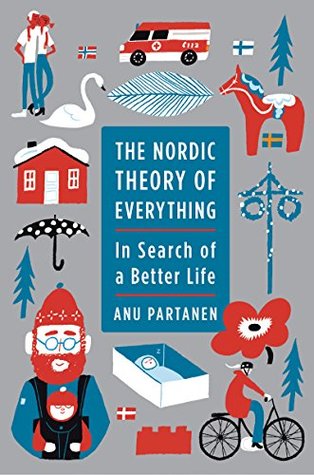More on this book
Community
Kindle Notes & Highlights
by
Anu Partanen
Read between
September 3 - September 14, 2023
It was all part of a way of doing things in the United States that, as I would gradually realize, forced you to be constantly on guard, constantly worried that whatever amount of money you had or earned would never be enough, and constantly anxious about navigating the complex and mysterious fine print thrown at you from every direction by corporations that had somehow managed to evade even the bare minimum of sensible protections for consumers.
stressed out, overworked, unhealthy, underpaid, insecure, and uncertain whether our children’s lives would be any better, back home in Finland the middle-class friends I’d left behind were enjoying a healthy work-life balance, enough free time and disposable income for truly rejuvenating vacations, and a universal and affordable health-care system
City. In the United States, when a woman sought commitment from a man, there was often an implicit or explicit understanding that what she was looking for was someone who, perhaps even over other qualities, was well paid.
I wondered why the symbol of our future matrimony had to be a display of money. And why should it display not my financial power, but his?
as an act of financial commingling.
Gradually it dawned on me how much people in America depended on their employers for all sorts of things that were unimaginable to me: medical care, health savings accounts, and pension contributions, to name the most obvious. The result was that employers ended up having far more power in the relationship than the employee.
In America jeopardizing your relationship with your employer carried personal risks that extend far beyond the workplace, to a degree unthinkable where I came from.
“In this country you are at the mercy of your employer. You really don’t have any rights. Because of that you live in a constant state of worry.”
Parental leave policy is not dependent on the whims of different employers of different sizes, or on the vagaries of different local arrangements. Nordic parental leaves are a function of a simple, straightforward, uniform national policy, and pay is furnished through taxes managed by each country’s social security system. To make things fair, Nordic parental leaves are funded by all employees and employers, not just the firms that happen to have hired pregnant women or women with small children.
American mothers spend about twice as much time caring for their children as do fathers, and when it comes to housework in general, American women spend about triple the amount of time on it that men do. American women spend far more time than men doing such unpaid work—substantially more than Nordic women do in relation to Nordic men.
when fathers as well as mothers take parental leaves, the family dynamic changes for the better, with men taking a more active role in raising children. Men also participate more in household tasks such as cooking or shopping, and women end up spending a fairer share of their time in paid work.
I admired the way Americans seemed so consistently to take responsibility for themselves, no matter what the situation, without ever expecting anyone else to do it for them. Certainly much of what has made America great has been this attitude of self-determination. Losing the capacity for self-determination is one of the things that many Americans worry about the most.
America’s reign of optimism contributes to a culture in which negative feelings are often unwelcome. Everyone from a cancer patient to the unemployed and the downtrodden is always expected to see the silver lining, envision a better future, and express gratitude for whatever little they’ve got going for them.


